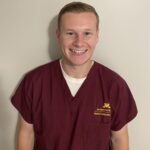Volume 36 Number 1 | February 2022
Alex Shaw, ASCLS Developing Professionals Forum Councilor-at-Large

According to the Merriam-Webster Dictionary:
- Diversity is “the state of having people who are different races or who have different cultures in a group or organization.”
- Equity is “fairness or justice in the way people are treated.”
- Inclusion is “open to everyone: not limited to certain people.”
Diversity, equity, and inclusion are not limited to just one culture or race; everyone has a right to be accepted and treated with respect. The last two years have displayed several horrific attacks against our minority communities, which is entirely unacceptable. ASCLS and the laboratory community condemn these attacks and show our support to these communities.
“Goal setting is an essential aspect of everyone’s life, and developing an overarching goal with several small, attainable goals makes becoming more diverse and inclusive a much easier task.”
ASCLS shows its support and dedication to being more diverse, inclusive, and equitable through many different channels, one of which is PRISM: Pride · Respect · Inclusion · Support · Momentum, held January 12-17, 2022. PRISM is now in its second year of operation. It is pushing to make even more significant strides in diversity, equity, and inclusion within the laboratory community and throughout the country. This year built off the success from 2021, continuing to hold uncomfortable conversations, reading different books, and interacting with speakers who have been at the forefront of ASCLS’ fight for diversity, equity, and inclusion.
Another way that ASCLS can promote diversity, equity, and inclusion is by utilizing the Mentor Match program. The Mentor Match program is available to ASCLS Developing Professional, Ascending Professional, or professionals who have been in ASCLS for less than five years. This program pairs the mentee with a mentor that can help develop the mentee’s personal and professional growth, including diversity, equity, and inclusion.
How can laboratorians be a part of this positive change to be more diverse, inclusive, and equitable? Laboratorians can set goals and actively promote diversity. Goal setting is an essential aspect of everyone’s life, and developing an overarching goal with several small, attainable goals makes becoming more diverse and inclusive a much easier task. Many laboratorians already use goal-setting techniques to grow professionally, but laboratory professionals can also use them to produce a more inclusive community.
An example of this could include the overarching goal of “being more inclusive,” with smaller sub-goals of “have a meaningful discussion with someone with a different cultural background than yours” and “research a culture different than your own to learn about its history.” I encourage everyone to include action steps to make each sub-goal more attainable. Holding yourself accountable will only make you a better ally to people with different cultures and identities.
Diversity, equity, and inclusion are everyone’s responsibility. Holding yourself, your peers, and those in your community accountable for making a positive change is the most critical step for a brighter future. The laboratory community has made tremendous strides to promote diversity, equity, and inclusion, but the work is far from complete. We must continue to take steps in the right direction so that everyone in this world feels safe and comfortable for who they are. I encourage everyone to participate in some way to be a part of this change, utilizing the resources ASCLS has to offer and by promoting change in your community.
Alex Shaw is a student and is employed by the University of Minnesota-Twin Cities in Minneapolis.